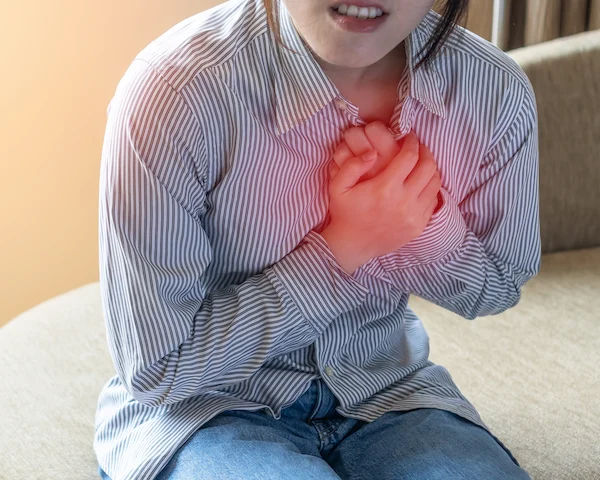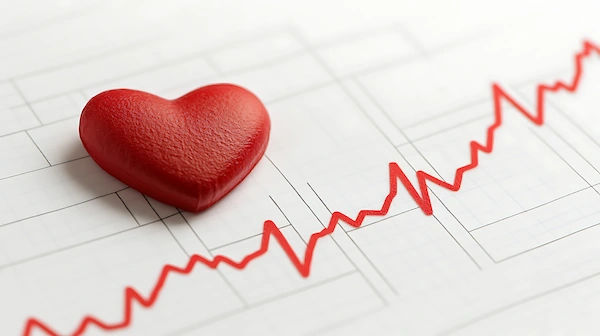- Female
- 21 Years
- 22/01/2025
Couldn't sleep well last night and only got a little bit of rest today. I didn't have any chest pain earlier, but now, during nighttime, I suddenly felt a shooting pain on the right side of my chest. It only lasts a few seconds, kinda like a sudden leg ache or headache. I also noticed an extra heartbeat. Could this be related to my heart? Why do we get chest pain when we're sleep-deprived?
Answered by 1 Apollo Doctors
Chest pain, especially on the right side, along with an extra heartbeat can be concerning symptoms. It is important to rule out any heart-related issues. However, in the context of being sleep-deprived, chest pain can also be caused by muscle strain or tension. To help with the chest pain and irregular heartbeat, you can take over-the-counter pain relievers like acetaminophen. Additionally, consider taking a muscle relaxant like methocarbamol to help with any muscle tension that may be contributing to the pain. Make sure to get adequate rest and improve your sleep hygiene to prevent further episodes.
Dr. Mubarak Suggests...
Consult a Cardiologist
Answered 04/07/2025
0
0


Ask Apollo
AI powered Health Chatbot
-
Causes of Chest Pain Related to Sleep Deprivation
- Lack of sleep can lead to muscle strain, stress, and increased pain sensitivity, causing brief chest pain.
- Sleep deprivation may trigger anxiety or stress, contributing to chest discomfort and palpitations.
-
Understanding the Nature of Your Chest Pain
- Shooting, brief chest pains are often benign, caused by muscle spasms or nerve irritation.
- Extra heartbeats (palpitations) can be linked to stress or sleep loss.
-
When to Be Concerned and Seek Medical Advice
- Seek urgent care if chest pain is accompanied by shortness of breath, dizziness, or prolonged pain.
- Consult a healthcare provider if chest pain persists or worsens.
-
Tips to Manage Symptoms and Improve Sleep
- Improve sleep hygiene: maintain a regular sleep schedule, create a restful environment.
- Practice stress management techniques to alleviate chest discomfort and palpitations.
-
Relevant Medical Specialties and Tests
- Consider consulting cardiology, neurology, or pulmonology if symptoms persist.
- Diagnostic tests like an ECG may be necessary if palpitations or chest pain continue.
Recommended next steps
Consult a Cardiologist or Consult a Neurologist
Answered 20/08/2025
0
0
More Cardiology Health Queries
View allI'm dealing with some chest pain and recently found out my blood pressure's been high at 14090 for the past two weeks, plus I've got high cholesterol. My doctor prescribed Rosuvas 10mg for the cholesterol but didn't give me anything for the blood pressure. Is it okay if I take EMBETA XR 50 along with Rosuvas just for a few days to manage the BP?
It is not advisable to take EMBETA XR 50 (Metoprolol) without consulting your doctor, especially since you have high blood pressure. Metoprolol is a beta-blocker that helps lower blood pressure and heart rate. It is important to have your blood pressure monitored regularly while taking this medication. If your doctor did not prescribe a blood pressure medication initially, it is best to follow up with them to discuss the need for adding EMBETA XR 50 to your current treatment plan.
Answered by 1 Apollo Doctors
I'm having this issue where my heart seems to race and my hands go numb. It gets really intense, like my heartbeat skyrockets, especially at night. Last night it happened again, and it's not the first time it also occurred about 15 days ago. I got an ECG done, and while my heart rate was really fast, my blood pressure was normal. What's going on here? Why is this happening to me?
panic attack hua hai apko consult psychiatrist
Answered by 1 Apollo Doctors
Is atherosclerosis reversible?
Various drugs, low fat diet and exercise can slow the effect of atherosclerosis but once a plaque is formed it is mostly not reversible. A person ahs to undergo procedures for removal of atherosclerotic plaque.
Answered by 1 Apollo Doctors
Disclaimer: Answers on Apollo 247 are not intended to replace your doctor advice. Always seek help of a professional doctor in case of an medical emergency or ailment.



